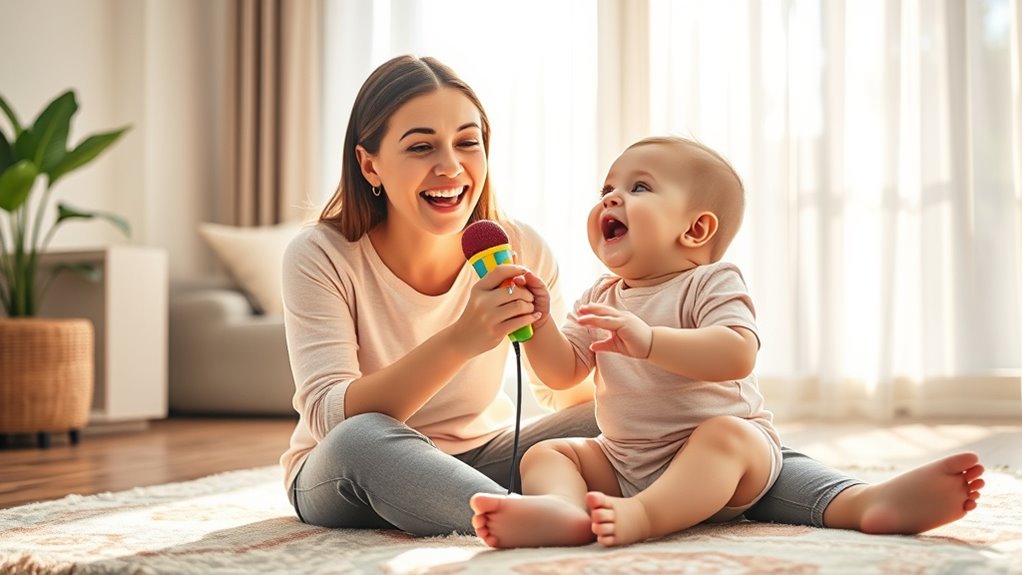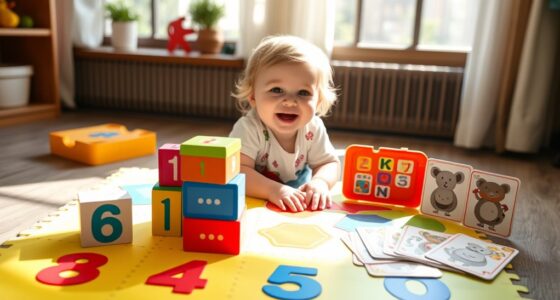Singing songs is a fun way to help your baby develop language skills by improving rhythm, pattern recognition, and vocabulary. When you sing, your little one learns to recognize beats, anticipate words, and connect sounds with meanings through repetition. Active participation with clapping or bouncing makes it multisensory, boosting attention and engagement. As you continue exploring, you’ll discover even more simple ways to turn music into a powerful language-building tool for your child.
Key Takeaways
- Singing develops rhythm awareness, helping babies recognize patterns in speech and improve timing.
- Repetitive lyrics in songs reinforce vocabulary and aid in associating sounds with meanings.
- Recognizing musical patterns builds anticipation and foundational skills in language pattern recognition.
- Multisensory engagement through singing, clapping, and movement enhances attention and language skills.
- Singing encourages active, enjoyable learning, boosting confidence and supporting early speech and language development.

Singing songs to your baby is a simple yet powerful way to boost their language skills. When you sing, you’re doing more than just entertaining them—you’re laying the foundation for essential language development skills. One key area you’ll notice improving is rhythm development. As you sing, your baby begins to recognize patterns in the beat and tempo, which helps them understand the natural flow of speech. This rhythmic exposure is indispensable because it establishes a sense of timing and cadence, making it easier for your little one to grasp the rhythm of words and sentences later on. Over time, these rhythmic cues help them anticipate language patterns, setting the stage for smoother speech production and comprehension.
In addition to rhythm development, singing is an excellent tool for vocabulary building. When you choose songs with simple, repetitive lyrics, your baby gets repeated exposure to new words in a fun and memorable way. Repetition is essential for language learning, and songs naturally incorporate this by reinforcing key vocabulary. As your baby listens and eventually tries to mimic the words, they begin to associate sounds with meanings, accelerating their ability to recognize and recall new vocabulary. Plus, songs often introduce words related to everyday objects, actions, or emotions, broadening their understanding of the world around them. The more words your baby hears in context, the more confident they’ll become in using those words themselves.
Singing also creates an engaging, multisensory experience that enhances learning. When you sing, your tone, pitch, and rhythm grab your baby’s attention more effectively than spoken words alone. This heightened engagement encourages active participation, whether through clapping, bouncing, or attempting to sing along. Such activities reinforce language patterns and promote both receptive and expressive language skills. Additionally, singing can be adapted to your baby’s developmental level, making it an accessible activity no matter their age or language ability.
Frequently Asked Questions
When Is the Best Time to Start Singing Songs to My Baby?
You should start singing songs to your baby early, even in the first few months. This helps boost their toddler vocabulary and supports their musical milestones. When you sing often, your baby becomes familiar with sounds, rhythms, and words, making language learning easier. Plus, singing creates a strong bond between you and your little one. So, don’t wait—begin singing as soon as possible to nurture their growth and love for music.
Are There Specific Songs That Boost Language Development More Than Others?
You might wonder if certain songs boost language development more than others. Focus on songs with simple lyrics and clear pronunciation, as they enhance your baby’s understanding. Songs with repetitive melodies and lyrical complexity help reinforce new words and sounds. Repeating catchy tunes encourages your baby to mimic sounds, building their vocabulary. So, choose songs with familiar melodies and straightforward lyrics to support their language skills effectively.
How Do I Choose Age-Appropriate Songs for My Baby?
Imagine choosing a lullaby that balances lyrical simplicity and cultural relevance, ensuring your baby stays engaged. When selecting age-appropriate songs, consider lyrical complexity—simple, repetitive words help early language learning. Look for tunes suited to your baby’s developmental stage, like nursery rhymes for infants. Songs that reflect your cultural background also foster a sense of identity. By choosing songs that match your baby’s age and cultural context, you support their language growth effectively.
Can Singing Songs Replace Other Forms of Language Learning?
Singing songs can’t fully replace other forms of language learning, but it’s a powerful supplement. Through music therapy and singing, you encourage speech imitation and reinforce vocabulary in a fun, engaging way. You help your baby develop listening skills, rhythm, and pronunciation, making words memorable. While conversation and reading are essential, singing creates a positive environment that boosts overall language development, complementing other methods effectively.
How Often Should I Sing to See Language Development Benefits?
You should aim to sing to your baby daily or at least several times a week, ensuring consistency and frequency. Regular singing helps reinforce language skills and keeps engagement high. Incorporate a variety of songs to expose your baby to different sounds and vocabulary, which accelerates language development. The key is to be consistent and make singing a natural part of your routine, so your baby benefits from continuous, diverse exposure.
Conclusion
By singing to your baby, you’re planting seeds in a musical garden, each note sprouting words and sounds that blossom into language. These melodies act like gentle waves, washing over their tiny minds and carrying new words ashore. So keep singing, and watch as your little one’s language skills grow like a vibrant, unstoppable garden in full bloom—full of endless possibilities and joyful discovery. Your voice is the magic wand guiding their journey.










